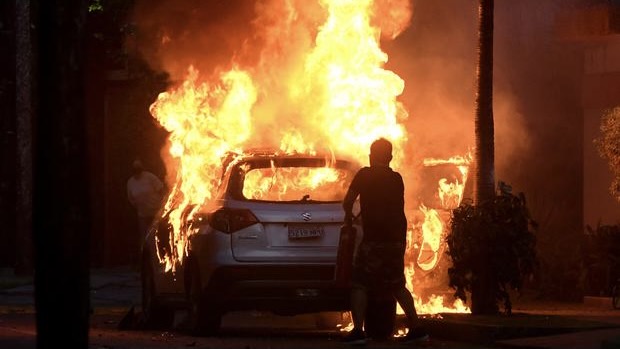Far-right extremist groups in Bolivia’s Santa Cruz department committed a new round of arson attacks against various public buildings on January 1 and 2. The attacks were carried out demanding the release of far-right opposition leader and governor of Santa Cruz, Luis Fernando Camacho, who was arrested by police authorities on December 28, 2022, in the ‘Coup d’état I’ case.
On Sunday night, members of the Santa Cruz Youth Union (UJC) and Pro Santa Cruz Civic Committee attacked the facilities of the state-owned bank, Banco Unión, with molotov cocktails and firecrackers. The fire caused by molotov cocktails damaged parts of the bank. Banco Unión rejected the attack on its facilities the same night, resumed its operations with all security measures the next day, and stressed that it would initiate legal action against those responsible for the damage.
On Monday night, the violent groups attacked the Departmental Police Command with molotov cocktails, firecrackers, sticks and stones. According to reports from local media, the attackers also attacked the group of women, who had been holding a vigil outside the police headquarters in support of Camacho since Monday morning.
The departmental deputy police commander, Colonel Edson Claure, reported that police officers responded to the attack using tear gas to disperse the violent group and prevent the seizure and burning of the headquarters. He added that videos were recorded to demonstrate what happened and identify some of those responsible for the attack.
This was the second time that the Santa Cruz’s Police Command was attacked. Earlier, on December 31, a group of 500 hooded people attacked the police, vandalized the facilities, hit the officials with sticks and stones, and set fire to three police vehicles.
Nuevo ataque, con fuegos artificiales, al Comando de policías, en Santa Cruz, por afines al gobernador Fernando Camacho. Esta noche incluso atacaron a personas que hacían vigilia a favor de la libertad de Camacho frente al edificio policial. @teleSURtv pic.twitter.com/qVYemoaCqi
— Freddy Morales (@FreddyteleSUR) January 3, 2023
Bolivian Attorney General Wilfredo Chávez expressed his repudiation of the acts of violence carried out by irregular groups linked to the UJC and the Civic Committee. “We repudiate acts of violence, they are not peaceful acts, they are organized acts of violence that must be punished according to criminal law,” he said in an interview with Bolivia TV on January 3.
Since Camacho’s arrest, violent protests have been constant in Santa Cruz, Camacho’s home department and a stronghold of right-wing opposition. In the past six days, hundreds of people have been injured and at least 10 public buildings have been affected by fires, in addition to damage and looting of numerous homes, private businesses and cars.
At least 22 people have been imprisoned for various acts of violence and have been charged with crimes of destruction and deterioration of State property, criminal association, public incitement to commit a crime, arson, and aggravated robbery.
The case against Camacho
Camacho was one of the key plotters of the 2019 civic-military coup against the then socialist president Evo Morales. He was the president of the Pro Santa Cruz Civic Committee in 2019. In October and November 2019, during the post-elections conflict, he organized and promoted violent and racist demonstrations against the Morales government across the country. He has been accused of terrorism, sedition and conspiracy. On December 30, 2022, a Bolivian court sentenced Camacho to four months of preventive detention in the Chonchocoro Prison while investigation in the ‘Coup d’état I’ case continues.
Read more: Far-right Bolivian leader Luis Fernando Camacho gets four months of pre-trial detention in coup case
Camacho’s supporters have deemed his apprehension as an “illegal kidnapping” in a “brutal” manner. These complaints have been rejected by the Prosecutor’s Office, and recalled that the arrest warrant for Camacho was issued in October 2022. The Office also denied the alleged injuries suffered by Camacho during his arrest, and ensured that he was arrested “respecting constitutional rights and human rights.”
Despite this, Camacho’s defense alleges that the detention was irregular and filed a freedom action in favor of the governor. The hearing to address that appeal was scheduled for January 2 in the Eighth Criminal Sentencing Court of Santa Cruz, but it was suspended after the judge declined her jurisdiction to take the case and transfer it to a judge in the capital La Paz.
At the same time, the general director of the Penitentiary Regime, Juan Carlos Limpias, rejected the claims made by Camacho’s lawyers, who said that his health was in danger. Limpias reported that according to the latest report from the doctors, Camacho’s health is “absolutely stable.” He also reported that Camacho has been receiving medical attention 24 hours a day, he was evaluated by a medical board made up of his family doctor, doctors from the Penitentiary Regime and doctors from the Ombudsman’s Office.
Ombudsman, Pedro Callisaya, who visited Camacho in prison this Monday, confirmed his health status. Calisaya told local media outside the prison that Camacho told him that he was “calm” and that he has been receiving medical attention, but that he “was expecting some results from their lawyers.”
Various Indigenous, peasant and social organizations as well as relatives of the victims of the Sacaba and Senkata massacres have expressed their satisfaction with Camacho’s arrest and have rejected the wave of violence unleashed by Camacho supporters.
During the mobilizations against the coup in November 2019, 38 Bolivians were killed, 800 people were injured, and over 1,000 citizens were unjustly detained.





